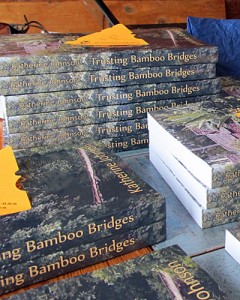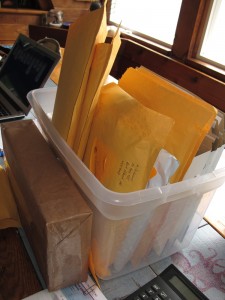They’re here, they’re here, they’re finally here!
It’s a little surreal to have a stack of cardboard boxes sitting on my office floor, full of shiny new novels; the covers unopened, the spines un-cracked. Pages covered in tiny black squiggles.
Words.
My words.
My very own “dictionary out of order.”
I’m excited and terrified to see my words in print. It’s one thing to write, rewrite, edit and write some more, but it’s quite another to throw those words out there for people to experience. To invite you into my head.
Communicating thoughts and feelings can be challenging, be it writing a novel, penning a condolence card, or tapping out an email. In the opening chapters of Trusting Bamboo Bridges, Geoff rereads and interprets the words faxed to him by his friend Kelley. The year is 1997 so email is just coming into its own, and Kelley hates the clunkiness of the medium, preferring to send faxes if she can. We forget how far technology has come in such a short time, and how much more interconnected we are today. How much easier it is to send words. One of the reasons I set the story when I did, besides the fact that it’s the era I know, is that I wanted my characters to feel truly disconnected. To wonder what each other are doing, and feeling, without the instant gratification of texting. To have to take decisions in isolation.
When, in 1995, I walked into the Burmese jungle, I effectively disappeared from the outside world. No one knew where I was, or if I was safe. Short wave radios, satellite phones, even cell phones existed, but due to security precautions, we didn’t use them. We tried our hardest to stick to our pre-planned schedule, but if we were delayed, the only way to let our colleagues in town know was to send a messenger. Notes passed from hand to hand along the route; carried by people we would never meet, but had to trust. We did the same, of course, acting as postal services between villages and camps. Correspondence was written with care in those days, as miscommunication could take days, or weeks to correct. Nowadays people get a little shaky when they have no cell signal or internet access. Words are sent more casually than they used to be. It’s both a blessing and a curse.
When they are on my computer, tweaking my words is a simple matter of hitting the delete button and correcting. Even once this blog is online, I can go back in and correct it if I choose. Once things are in print, however, there is no turning back. That is why looking at that box of novels is so daunting. My dining room table is full of bubble envelopes and parcels bulky with books awaiting their onward journeys. To readers close-by. To readers far away. It’s said that writing is as close as humans get to telepathy, and I think it’s true, but my words will be doing their job, unsupervised. In Port Alberni, Vancouver, Toronto, Cannes, and Brisbane, my words will be whispering into the imaginations of people around the world. With any luck, not only my thoughts but my feelings will come through on those pages (it is certainly the aim of fiction writers to do so) but I’ll have no control over how you interpret them, or what you take from them. It’s a little unnerving.
With Trusting Bamboo Bridges I’m inviting you into my head, to join me for the movie that’s been running in my imagination for the past 5 years. I’m inviting you to read my mind, and hear my voice. To grab a bowl of your favourite snack, a refreshing beverage, turn off your phone and travel with me to Thailand. To a time and place with old-fashioned miscommunication. I hope you enjoy my words.






Kathy,
Just finished “Trusting Bamboo Bridges” Loved it. It is hard for me to imagine living through an experience discribed in your book.
Thanks!
Russ